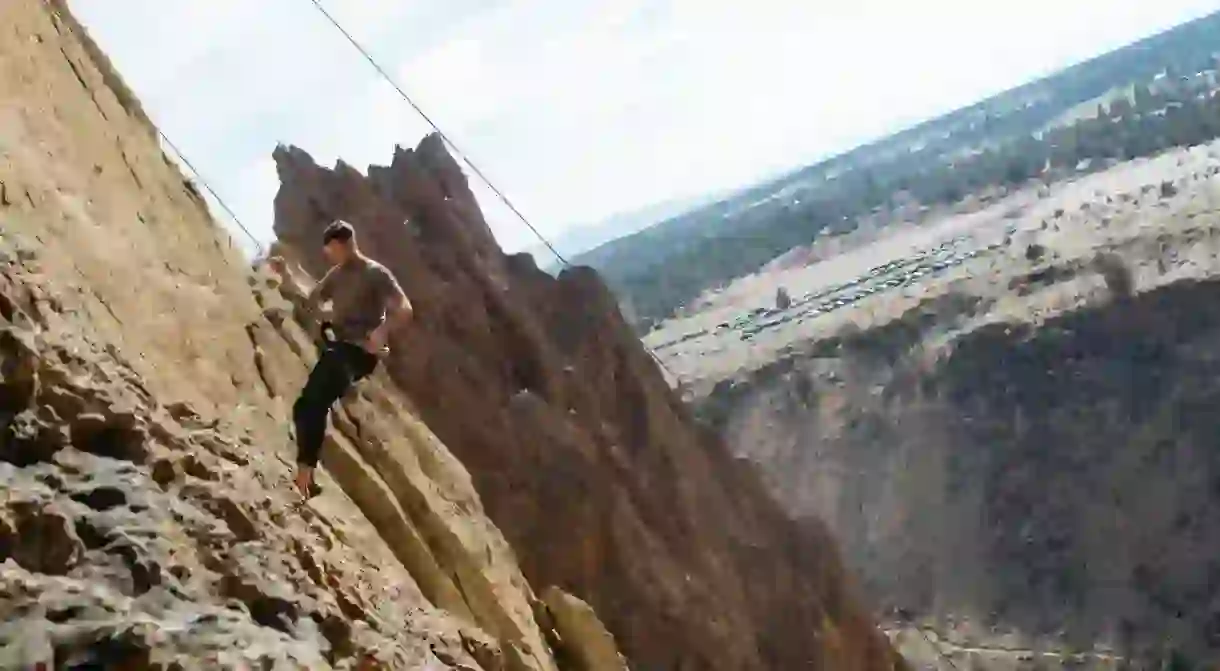A Guide to Climbing and Hiking in Smith Rock State Park

Just northeast of Bend in Oregon, towers a mecca for rock climbers and hikers alike.

Smith Rock State Park is 650 acres of pure wonder for rock climbing and hiking enthusiasts. Located less than 30 miles northeast of Oregon’s high desert hub—Bend—its 3,000 ft elevation and towering rock spires attract approximately 800,000 visitors every year, including climbers from around the globe.

The jutting rocks that make up Smith Rock’s ridgeline began to form 30 million years ago, when massive amounts of ash and debris from the eruptions of nearby volcanos filled the crooked river caldera and hardened into rock. The result was the vast walls and spires of Smith Rock Tuff—the largest rock formation on the western rim—which rise up to 550 ft.
Tens of millions of years later, flows of basalt lava poured into the area from vents almost 50 miles away, creating the cap on the tuff in the caldera. The Crooked River then carved its way through the rock layers to create the features seen today. The ridgeline soars at 3,200 ft, 600 ft above the river gorge below.

Though a breathtaking spectacle, Smith Rock is not without its dangers—especially for rock climbers. Seven visitors have died in the park from 2002 to 2017, with four of those deaths coming in the past two years. This year, the park has already claimed the life of 20-year-old climber Alex Reed and critically injured another climber, whose 30-foot fall was broken by a picnic bench. Others have had to call for help after finding themselves stuck on a rock face.
The most important thing a climber can do (aside from bringing a climbing partner) is make sure to find a route that fits their experience level. Luckily, with nearly 2,000 routes ranging from fourth class to 5.14, choosing something in your comfort level shouldn’t be difficult to find.

However, if that many options seems overwhelming, guidebooks have been written on the area and Smith Rock’s official website provides digestible synopses of its many climbing areas, complete with routes detailing the experience level, and number of bolts and pitches needed to complete the climb. For those who don’t feel comfortable climbing on their own, Smith Rock also offers guided climbs.

If rock climbing isn’t your thing, and you’d rather explore your surroundings by foot rather than slackline, Smith Rock has you covered as well. The expansive park boasts 12 official trails (and more that connect to trails outside its boundaries), and like its rock climbing routes, there are hikes that appeal to any and all experience levels. The easy .5 mile Rim Rock Trail and mostly flat 2.5 mile River Trail are ideal for families, while more difficult Summit and Misery Ridge Trail reward experienced hikers with breathtaking views after trekking up miles of elevation.
Those who want to bring their four-legged friends with them may do so, as long as they follow the park’s leash laws. And though the park is open year-round, the temperatures can rise up to 100 degrees in the summer, so always remember to pack more water than you think you need.

No matter the activity, days of adventure beckon for those who visit Smith Rock, so it’s always recommended to book accommodations and make a trip out of it. The park offers a walk-in campsite called The Bivy, which is first-come first-served and doesn’t accept reservations.
Campsites run $8 per person per night, with a maximum stay of 14 nights, and tend to fill up over the weekend in the spring and summer. If The Bivy is full or you’re traveling in an RV or camper, there are plenty of nearby campsites and RV parks that can accommodate your needs.
If you’re more of a planner (or just don’t like camping, we won’t judge), there are numerous vacation rentals available near the park, so you can adventure by day and relax at night. After all the exploring, your feet may welcome the rest.



















